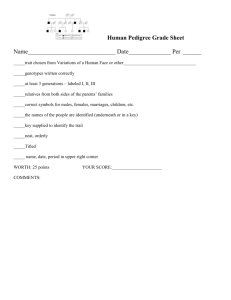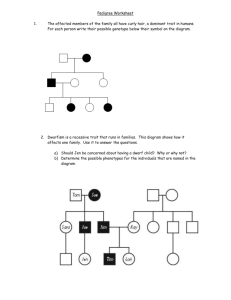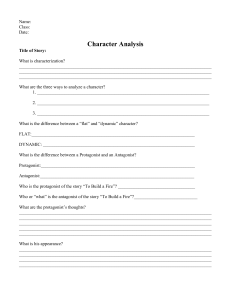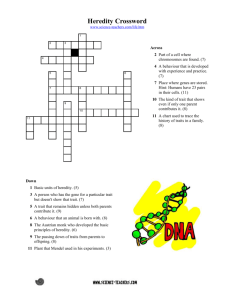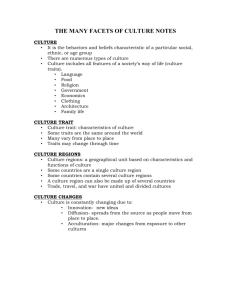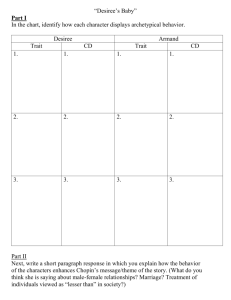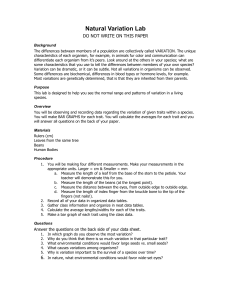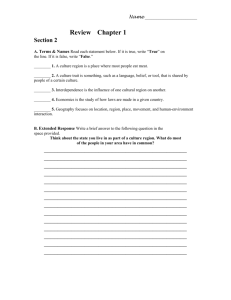English 6
advertisement
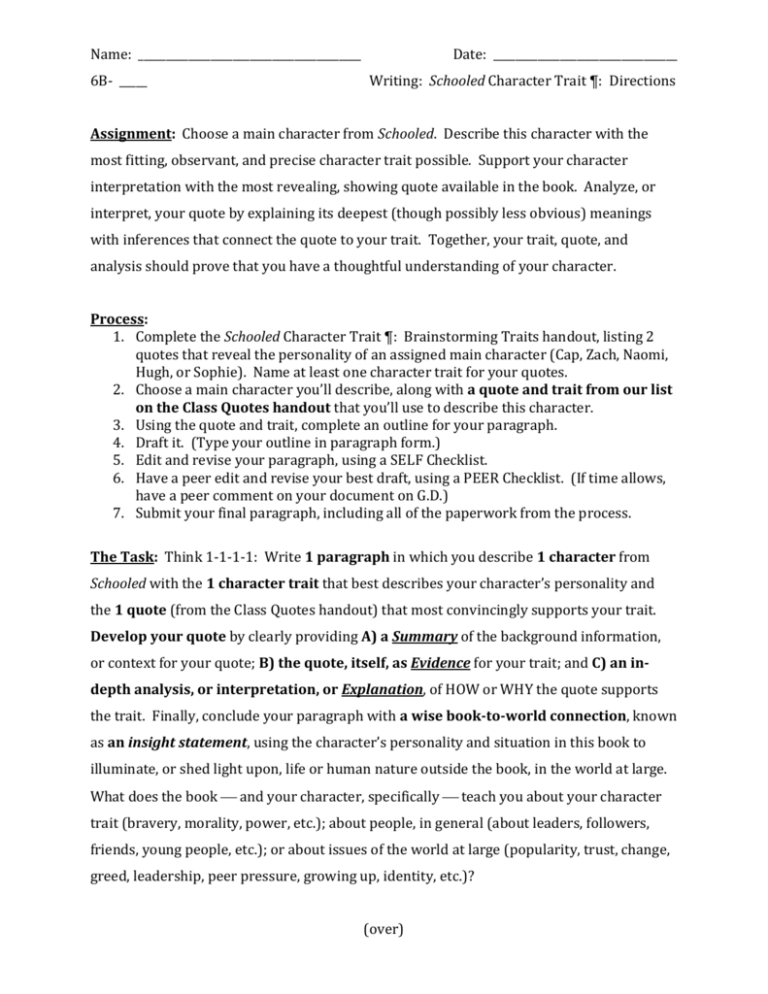
Name: ________________________________________ 6B- _____ Date: _________________________________ Writing: Schooled Character Trait ¶: Directions Assignment: Choose a main character from Schooled. Describe this character with the most fitting, observant, and precise character trait possible. Support your character interpretation with the most revealing, showing quote available in the book. Analyze, or interpret, your quote by explaining its deepest (though possibly less obvious) meanings with inferences that connect the quote to your trait. Together, your trait, quote, and analysis should prove that you have a thoughtful understanding of your character. Process: 1. Complete the Schooled Character Trait ¶: Brainstorming Traits handout, listing 2 quotes that reveal the personality of an assigned main character (Cap, Zach, Naomi, Hugh, or Sophie). Name at least one character trait for your quotes. 2. Choose a main character you’ll describe, along with a quote and trait from our list on the Class Quotes handout that you’ll use to describe this character. 3. Using the quote and trait, complete an outline for your paragraph. 4. Draft it. (Type your outline in paragraph form.) 5. Edit and revise your paragraph, using a SELF Checklist. 6. Have a peer edit and revise your best draft, using a PEER Checklist. (If time allows, have a peer comment on your document on G.D.) 7. Submit your final paragraph, including all of the paperwork from the process. The Task: Think 1-1-1-1: Write 1 paragraph in which you describe 1 character from Schooled with the 1 character trait that best describes your character’s personality and the 1 quote (from the Class Quotes handout) that most convincingly supports your trait. Develop your quote by clearly providing A) a Summary of the background information, or context for your quote; B) the quote, itself, as Evidence for your trait; and C) an indepth analysis, or interpretation, or Explanation, of HOW or WHY the quote supports the trait. Finally, conclude your paragraph with a wise book-to-world connection, known as an insight statement, using the character’s personality and situation in this book to illuminate, or shed light upon, life or human nature outside the book, in the world at large. What does the book and your character, specifically teach you about your character trait (bravery, morality, power, etc.); about people, in general (about leaders, followers, friends, young people, etc.); or about issues of the world at large (popularity, trust, change, greed, leadership, peer pressure, growing up, identity, etc.)? (over) Objective Tone: Write your argument for an audience, or readers, who might be unfamiliar with your book. Use objective tone. In other words, give your wording a factual, formal, impersonal sound. To do this, avoid referring directly to yourself, the writer (I, me, my, mine…); to your reader (you, your, yours…); or to your writing (in this paragraph…; this quote proves that…; in conclusion…; my first example is…; etc.). Finally, avoid slang (casual language: stuff; OK; Well, Cap thinks…; etc.). Character Traits: A character trait is a distinguishing descriptive word (an adjective) that describes an important part of a character’s personality. To single out a character trait for a character, think about what this character says (Dialogue); what he or she does (Actions); what he or she feels (Feelings); and what he or she thinks (Thoughts). Likewise, you might want to think about other characters’ responses (Dialogue, Actions, Feelings, and Thoughts) to your character. Think D.A.F.T.: Dialogue, Actions, Feelings, and Thoughts. Personal information (birthdate, birth order, parents’ names, siblings’ names, hometown, etc.) and physical looks (tall, red hair, blue eyes, etc.) can also shape a character, though these tend not to be the most revealing details. Often the most dramatic or meaningful moments in the book will provide you with your evidence. During these moments, characters often define themselves, similar to the way people in the real world do the same. In other words, your interpretation of a character should show understanding and wisdom, or insight, into the most basic, or fundamental, nature of a character and should not simply be a stereotype, which would fail to recognize the deeper aspects of a character. Interpret not just the words, actions, feelings, or thoughts of your character; interpret his or her motivation for these words, actions, feelings, or thoughts too. Avoid traits that are too general, too simple, or too superficial (nice, funny, mean, special, amazing, etc.). Avoid nouns (leader; hippie; jock, etc.). Avoid judgmental language (weird, stupid, dumb, abnormal, clueless, cocky, etc.) and slang (awesome, cool, “bossy,” etc.). Finally, avoid traits for a temporary mood (shocked, disappointed, amazed, etc.) that don’t really capture a deep, important, more permanent part of the character’s identity. Good traits are specific. They reveal something that makes a particular character different from other people, that shows a distinct, singular side of his or her personality. (over) 2 Examples of Character Traits: Self-Assured, Confident Insecure, Timid, Fearful, Awkward Selfless, Humble, Modest, Unassuming, Self-Centered, Narcissistic, Conceited, Respectful, Attentive Arrogant, Superficial, Materialistic, SelfAbsorbed, Self-Righteous Loyal, Altruistic, Faithful Disloyal, Opportunistic Mature, Responsible, Trustworthy Immature, Irresponsible, Untrustworthy Wholesome, Philanthropic, Humane, Malicious, Malevolent, Mischievous, Compassionate, Empathetic, Pacifistic, Inhumane, Insidious, Conniving, Even-Tempered, Easy-Going, Argumentative, Quarrelsome, Benevolent, Noble, Virtuous, Dignified Aggressive, Restless, Irritable, Cantankerous, Ill-Tempered Honest, Sincere, Candid, Outspoken Dishonest, Insincere, Deceitful, Conniving Observant, Perceptive, Wise, Insightful Apathetic, Gullible, Passive, Vulnerable, Foolish, Naïve, Ignorant Open-Minded, Adaptable, Reflective, Closed-Minded, Stubborn, Judgmental, Fair, Impartial, Unbiased, Critical, Cynical, Biased, Prejudiced, Rational, Even-Handed, Conscientious, Intolerant, Bigoted, Discriminatory, Righteous, Well-Intentioned, Tolerant, Narrow-Minded, Opinionated, Unjust Lenient Courageous, Bold, Audacious, Brave, Fearful, Regretful, Cowardly, Meek, Assertive, Uninhibited, Expressive Timid, Shy, Retiring, Reserved, Withdrawn, Solitary, Inhibited, Shameful Moral, Ethical, Scrupulous, Honorable, Immoral, Unethical, Unprincipled, Reputable, Genuine, Unpretentious Unscrupulous, Dishonorable, Corrupt, Fraudulent, Deceitful, Duplicitous, Hypocritical Optimistic, Hopeful, Idealist Pessimistic, Negative Powerful, Domineering Powerless, Submissive Charismatic, Charming, Polite Despicable, Loathsome, Rude, Smug Generous, Charitable Miserly, Spiteful, Unmerciful Patient Impatient Introverted, Extroverted Anti-Social, Deviant Superior, Ambitious, Power-Hungry, Inferior, Self-Conscious Competitive Determined, Persistent, Tenacious, Indecisive, Hesitant, Self-Doubting, Resolute, Steadfast, Insistent, Decisive, Faltering, Fickle, Ambivalent, Committed, Dedicated, Diligent, Non-Committal, Industrious, Meticulous, Thorough Grateful, Appreciative, Gracious Ungrateful, Unappreciative Independent, Self-Sufficient, Resourceful, Dependent, Needy, Unimaginative, Dull, Imaginative, Creative, Practical, Insipid, Sheltered Inventive, Original, Quirky, Idiosyncratic Note: A character trait is NOT a physical description (tall, short, messy, neat, etc.); a mood (bored, “hyper,” etc.) or a temporary reaction (stunned, surprised, shocked, confused, stressed, thrilled, etc.); a critical term (dumb, weird, annoying, etc.); a noun (leader, follower, hippie, bully, princess, athlete, jock, etc.); or a slang term (awesome, cool, etc.). (over) 3 4

